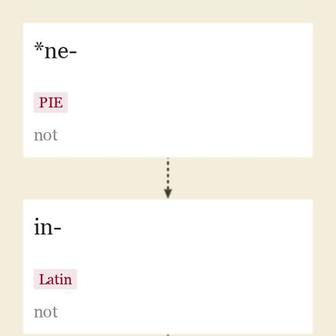impermanent (adj.)
1650年代,源自于 in-(表示“不,相反”; 见 in-(1))和 permanent 的合并形式。
最早记录年份: 1650s
impermanent 的相关词汇
in- (1)

这个词缀的意思是“不,相反,没有”(也可以是通过与后面的辅音音节化的 -n- 的同化而来的 im-, il-, ir-,这种趋势始于后期拉丁语),源自拉丁语 in- “不”,与希腊语 an-,古英语 un- 同源,均来自 PIE 词根 *ne- “不”。
在古法语和中古英语中,通常使用 en-,但大多数这些形式在现代英语中已经不再使用,只有极少数(例如 enemy)不再被视为否定的。在英语中的经验法则是,对于明显的拉丁语元素使用 in-,对于本土或本土化的元素使用 un-。
permanent (adj.)
"持久的,不变的,不受影响的,持续存在或打算永久存在的”,早在15世纪,源自于14世纪的古法语 permanent, parmanent,或直接源自于拉丁语 permanentem(nominative permanens),“剩余的”, permanere 的现在分词形式,意为“忍耐,坚持,继续,坚持到底”,源自于 per 的“穿过”(来自 PIE 词根 *per-(1),“向前”,因此是“通过”的意思)和 manere 的“停留”(来自 PIE 词根 *men- (3),意为“保持不变”)。
相关词汇: Permanently。作为名词的意思是“永久波浪”,最早见于1909年。至于服装, permanent press 中指的是一种旨在产生持久褶痕的过程,可以追溯到1964年。
impermanence (n.)
1796年,由 impermanent 和 -ence 组成。 Impermanency 可追溯至1640年代。